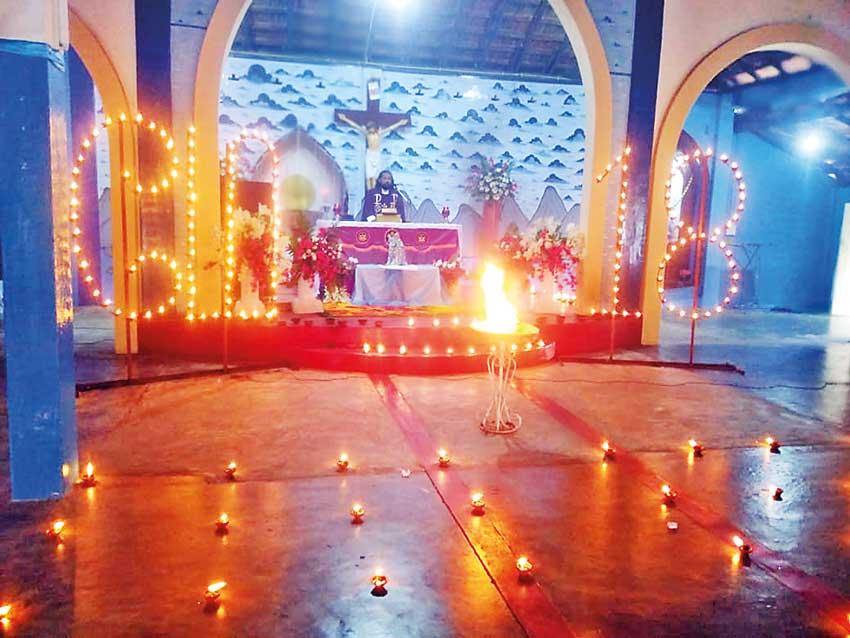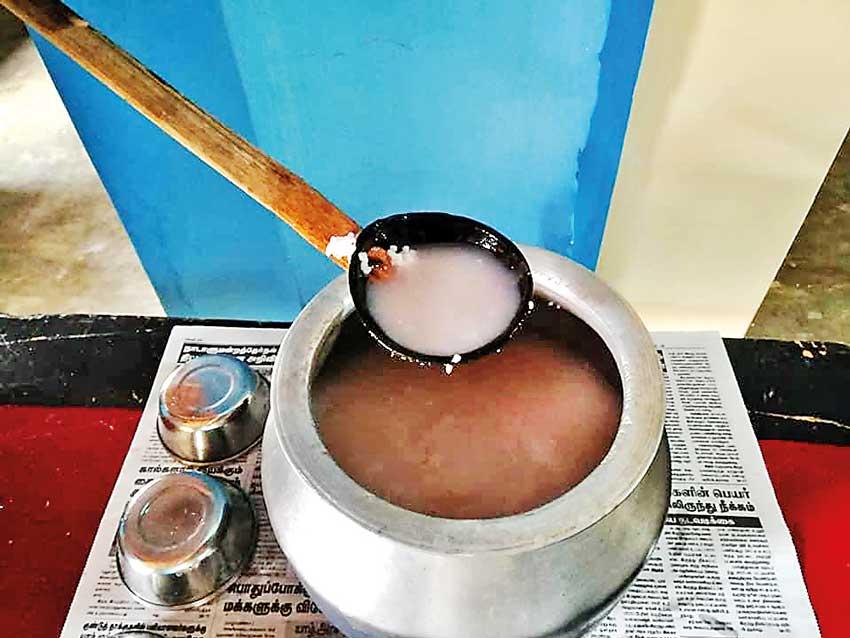Reply To:
Name - Reply Comment

The Catholic Church in the tiny village of Iranapalei in the Mullaitheevu district was lit up with 1000 lamps on May 18
On May 18, the reward for lighting 1000 lamps was to be summoned by the local police
The remembrances were not covered in any of the news broadcasts by Colombo based state or private TV channels that this writer watched
for many who suffered, remembrances, and an environment where this can be done without obstacles will be important
 The Catholic Church in the tiny village of Iranapalei in the Mullaitheevu district was lit up with 1000 lamps on May 18. The thousand lamps were to remember the tens of thousands, possibly even more than a hundred thousand, that had perished during the last stages of the war. Iranapalei and it’s surroundings had experienced some of the bloodiest moments of the war in 2009 and many had died, disappeared, been physically and mentally scarred. Everyone in Iranapalei was displaced in 2009 and they were only allowed to return in 2011 or 2012.
The Catholic Church in the tiny village of Iranapalei in the Mullaitheevu district was lit up with 1000 lamps on May 18. The thousand lamps were to remember the tens of thousands, possibly even more than a hundred thousand, that had perished during the last stages of the war. Iranapalei and it’s surroundings had experienced some of the bloodiest moments of the war in 2009 and many had died, disappeared, been physically and mentally scarred. Everyone in Iranapalei was displaced in 2009 and they were only allowed to return in 2011 or 2012.
Conscious of COVID-19, the parish priest had held an early morning mass with a handful of Catholic sisters and laymen. But individual persons, mostly war survivors and remaining members of families whose loved ones were killed or had disappeared, had visited the church throughout the day. The church also left a pot of Kanji for people who came by – Kanji being the only basic meal many starving civilians could afford to eat during last stages of war.
People of Iranapalei
Like the people of Iranapalei, the parish priest had also experienced multiple displacement, hunger, fear, fired at in no fire zones, sought shelter in bunkers and helplessly witnessed mass death and destruction. There was an offer to evacuate the clergy, but this priest was amongst a small group of heroic Catholic clergy who opted to remain with the civilians in the war zone, till everyone had left. 11 years ago, the reward for his decision was 100 days of detention when the war concluded. On May 18, the reward for lighting 1000 lamps was to be summoned by the local police.

The church also left a pot of Kanji for people who came by ; Kanji being the only basic meal many starving civilians could afford to have during last stages of the war
Throughout the Tamil majority North and East, including in Mullivaikkal, where the war came to a bloody end, commemorations were held to remember war dead and mourn collectively. Due to COVID-19, there were no large gatherings like the past few years. But May 18 and days leading to it, there were many reports of remembrances conducted by Tamils in the north and east facing obstructions, intimidations and threats by the police and the army; not sparing the ones held even at private offices.
From Colombo, the President and the Prime Minister issued statements to mark the end of the war. Both had focused on the war victory and saluting the military, which along with the LTTE, stands accused of serious and systemic rights violations. A war heroes commemoration was held in Colombo on May 19 and the President was presided over. The Prime Minister’s message said the war was not waged against Tamils, but there was no message of solidarity or reference to the large numbers that died, disappeared and injured in the war; most of whom were Tamils. Both had also ignored the emotionally charged remembrances by Tamils across the North and East. The remembrances were not covered in any of the news broadcasts by Colombo based state or private TV channels that this writer watched that night.
May 18 has become a day that indicates how ethnically divided Sri Lankans are and this year was no exception. On May 18 and the days before and after, many Tamils in the north and east are inclined to mourn the loss of their loved ones and many Sinhalese in the south and rest of the country are inclined to celebrate the government’s war victory. But for many who suffered, remembrances, and an environment where this can be done without obstacles, intimidations, threats and fear, will be an important part of moving on.
After 11 years, prospects for a political solution to address root causes of the war remain bleak. Many Tamils have been trying to deal with postwar challenges such as increasing militarization, finding disappeared family members, getting military occupied land released, engaging in sustainable livelihoods, housing and coping with violence and discrimination based on gender and caste. Sinhalese and Muslims who have suffered during the war, including injured soldiers and families of dead soldiers, particularly wives, have also been struggling to move on. They too grieve the dead, look for disappeared loved ones, struggle to resettle in their traditional lands after displacement, face gender based violence and economic hardships.
The 11 years has seen some determined and inspiring struggles, such as by families of disappeared and communities struggling to regain military occupied lands. There has also been some rare, but inspiring instances of solidarity across ethnicity and geography, particularly by women. Despite the darkness around us, these struggles and acts of solidarity, like the 1000 lamps in Iranapalei, fuels hope of healing pains and the possibilities of co-existence of different communities with rights and dignity for all.